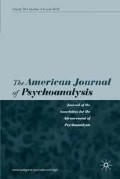Abstract
The Hungarian Pikler-Lóczy Institute for Infants’ Well-being and Healthy Development could not have been created without the fundamental contribution of the Budapest School’s approach to Object Relations. For historical reasons, very little is known in psychoanalytical circles about this extraordinary experience and work. Pikler created an original model with a space for partnership, reciprocity, and the baby’s “true” autonomy, which focuses on the baby’s self-initiated motor development: “freedom to move”. The atmosphere of this world around babies can be related to the “rêveries” of Ferenczi about the necessity for an early, caring environment provided through adult tenderness as it appears in his Clinical Diary.
Similar content being viewed by others
Notes
“Lóczy, une maison pour grandir” is a film by Martino (2000—France, 170 min), where the director traces back the historical and cultural context in which this institution was born and shows the pedagogical approach in which it operates. Also see Martino’s (2001) book.
“Empathy” is here understood in the psychoanalytical way described by Stefano Bolognini in his book L’Empathie Psychanalytique (2006).
References
Bick, E. (1964). Notes on infant observation in psychoanalytic training. International Journal of Psycho-Analysis, 45, 558–566.
Bollas, C. (2011). The Christopher Bollas reader. London: Routledge.
Bolognini, S. (2006). L’empathie psychanalytique. [Psychoanalytical empathy]. Paris: Érès.
David, M. & Appell, G. (1968). Lóczy ou le maternage insolite. [Lóczy or the unusual mothering]. Paris: Edition Scarabée.
Ferenczi, S. (1908). Psychanalyse et pédagogie [Psychoanalysis and education]. In L’enfant dans l’adulte [The child in the adult] (pp. 29–40). Paris: Payot & Rivages 2006.
Ferenczi, S. (1932 [1995]). The clinical diary of Sándor Ferenczi. J. Dupont (Ed.), M. Balint & N. Z. Jackson (Trans.). Cambridge, MA: Harvard University Press, 1988 (second printing, 1995).
Golse, B. (2009). Le droit des bébés à disposer d’eux-mêmes [The right of self-ownership of babies]. Psychiatrie Française, 40 (4), 97–110.
Golse, B. (2010). Communication in the symposium “Infancy in Times of Transition” at the 12th World Congress of the World Association for Infant Mental Health, June 29–July 3, 2010, Leipzig.
Haag, G. (1990). Identifications intracorporelles et capacités de séparation [Intracorporal identifications and capacities to separate]. Neuropsychiatrie de l’enfance et de l’adolescence, 38 (4–5), 245–248.
Haag, G. (1991). Nature de quelques identifications dans l’image du corps. Hypothèses [The nature of some identifications in the body image. Hypotheses]. Journal de la Psychanalyse de l’enfant, 10, 73–92.
Martino, B. (2000). Lóczy, une maison pour grandir. [Lóczy, a house in which to grow up] J.C. Lattes (Ed.). Documentary film by the Association Pikler-Lóczy-France.
Martino, B. (2001). Les enfants de la colline des roses: Lóczy, une maison pour grandir. Paris: J. C. Lattès.
Meltzer, D. (1978). A note on introjective processes. In A. Hahn (Ed.) Sincerity and other works: Collected papers of Donald Meltzer. London: Karnac, 1994.
Novick, K. K. & Novick, J. (2003). Two systems of self-regulation and the differential application of psychoanalytic technique. American Journal of Psychoanalysis, 63 (1), 1–20.
Pikler, E. (1984). Importance du mouvement dans le développement de la personne initiative- competence [The importance of movement in the development of the person: Initiative and competence]. La Médecine Infantile, 91 (3), 273–278.
Roussillon, R. (2002). Le transitionnel et l’indéterminé [The transitional and the indeterminate]. In B. Chouvier (Ed.) Les processus psychiques de la médiation (pp. 61–80). Paris: Dunod.
Szanto, A. (2012). Lóczy, un nouveau paradigme? L’Institut Pikler dans un miroir à facettes multiples [Lóczy, a new paradigm? The Pikler institute in a multi-faceted miror]. In Le fil rouge. Paris: Presse Universitaire de France.
Tardos, A. (2008). Les soins corporels à la pouponnière de Lóczy de l’Institut Emmi Pikler [The bodycare in the residential nursery of Lóczy in the Pikler Institute]. In: M. David (Ed.) Le bébé, ses parents, leurs soignants (pp. 117–132). Paris: Érès Edition.
Winnicottian, D. (1958). De la pédiatrie à la psychoanalyse [Through pediatrics to psycho-analysis. Collected papers]. Paris: Payot. N.Y.: Brunnel/Mazel 1992.
Author information
Authors and Affiliations
Additional information
A version of this paper was presented at the “Sincerity and Freedom in Psychoanalysis” conference at the Freud Museum, October 2013.
1Julianna Vamos, Ph.D., Pychoanalyst at the Paris Psychoanalytic Society; Perinatalist at the Maternity Clinic: Les Bluets, Paris; Training psychologist for the French Pikler Lóczy Association.
Rights and permissions
About this article
Cite this article
Vamos, J. FREE TO MOVE, FREE TO BE. Am J Psychoanal 75, 65–75 (2015). https://doi.org/10.1057/ajp.2014.60
Published:
Issue Date:
DOI: https://doi.org/10.1057/ajp.2014.60




